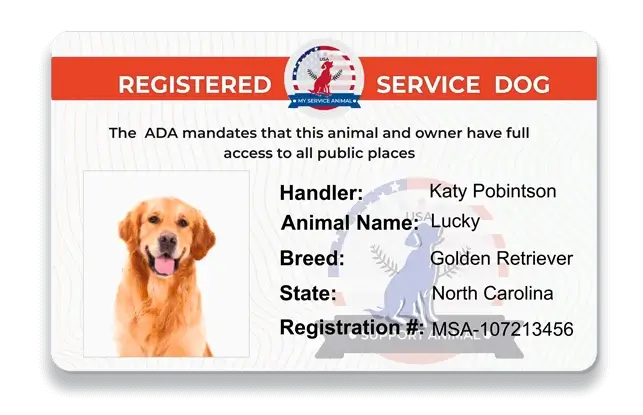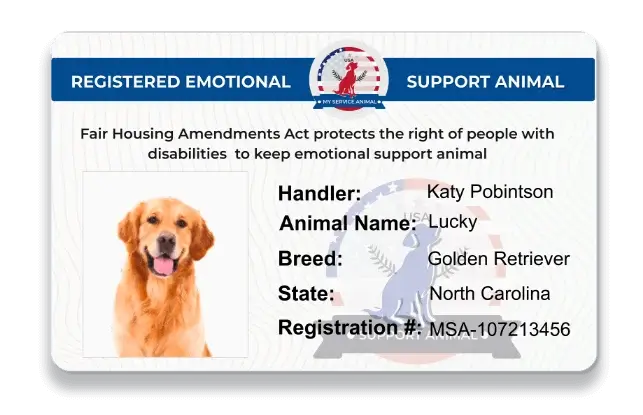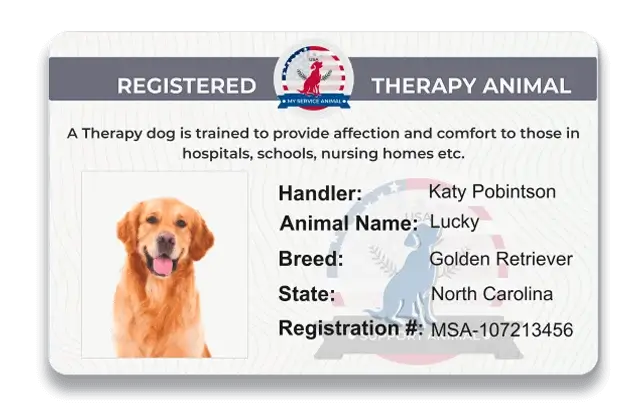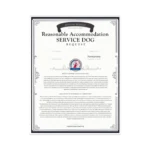Select Your Animal's Registration
Сertification details:
Bi-Polar
Depression
Eating Disorders
Emotional / Psychological
Mood Disorders
Phobias
Separation Disorder
Social Anxiety
Substance Abuse
How to Register Service Dog Online
Benefits of Registering Your Assistance Animal
SERVICE ANIMAL
RegistrationEMOTIONAL SUPPORT ANIMAL
RegistrationTHERAPY ANIMAL
RegistrationAccessories
Official Service Dog ID – Only $49
Complete registration and access Digital ID immediately. Best price on the market guaranteed!MyServiceAnimal Reviews
ADA Service Animal Laws & Regulations
On September 15, 2010, definitive regulations concerning the Americans with Disabilities Act (ADA) for Title II (State and local government services) and Title III (public accommodations and commercial facilities) were proclaimed by the Department of Justice in the Federal Register. These regulations (or requirements) include renewed rules, as well as the 2010 Standards for Accessible Design.
Americans with Disabilities Act Overview
This edition explains what “service animal” means and what their provisions are in the Department’s regulations starting from March 15, 2011. According to titles II and III of the ADA, it can be dog and mini horses. Titles also allow them to escort handlers with disabilities to public places.
How “Service Animal” Is Defined
Service animals – dogs or mini horses that are trained precisely to assist in duties or tasks for disabled people. They are working animals – not pets, and are instructed specifically to do the task disabled people can’t do themselves. Examples of such tasks:
- Guiding those who are blind or have problems with vision;
- Alerting deaf people;
- Helping in wheelchair management;
- Reminding mentally ill people to take medicines;
- Warning and keeping safe people with a seizure;
- Calming those with Post Traumatic Stress Disorder (PTSD) when they suffer from anxiety attacks, etc.
Dogs that give emotional support don’t belong to the “service animals” due to the ADA, those are listed in the “assistance animal” category. Some states define service animals more broadly, but this info should be clarified at the relevant State attorney general’s office.
Where Are Service Animals Allowed? Is the ADA dog registry legit?
Due to the ADA regulations, service animals are able to follow you everywhere where people are allowed to go. For example, it is appropriate to have such an assistant animal with you in a hospital area as examination and patient rooms, cafeterias, etc., but not in areas that demand a sterile environment (operating rooms or born units).
MyServiceAnimal National Registrar
The National Assistant Animal Registrar can help you determine if you qualify to own a service dog and assist you in obtaining the necessary paperwork for ADA registration.
At MyServiceAnimal, we understand how important it is to have an assistant animal that is recognized and respected. That’s why we offer a service dog registration and provide guidance on requirements, including how to obtain an ADA doctor’s letter.
Whether you need an assistant animal for mobility, hearing or vision impairments, or other disabilities, we can guide you through the process of obtaining the necessary support.
Trust MyServiceAnimal for all your assistant animal needs and experience the benefits of having a certified service animal by your side.
Read the law according to the category
LEGIT SERVICE DOG REGISTRATION
Specially trained to perform a task that directly assists you with your disability.
Under the American Disability Act, Service Dogs are permitted to accompany you in Pet-Free Areas.
EMOTIONAL SUPPORT ANIMAL REGISTRATION
Provide you with general comfort and emotional well-being.
They have a Legal Right to Accommodation generally exempt from your lease/landlord’s pet policy.
Therapy Dogs volunteer with their owners at schools, hospitals, and nursing homes, and provide comfort in high-stress situations.
Therapy dogs do not have special access outside their volunteer programs.
Check MyServiceAnimal Registration Status
National Animal Registrar FAQ
General Questions
At the national assistant animal registry MyServiceAnimal we provide:
Service Dog Registration (ADA)
Assist people with disabilities. They are specially trained to provide those types of services the owner is in need of.
Emotional Support Animal Registration (ESA)
ESAs are those animals that provide comfort and emotional support to the owner with anxiety, panic attacks, depression, etc. Any type of animal can be an ESA. To register them, a letter from a therapist that confirms your emotional problems is necessary.
Those are pets that give moral support to those in need of it in such establishments as hospitals, retirement houses, rehabilitation centers, etc. Pet owners can register his/her animals as therapy animals after the training.
In order to register your pet, please, choose a proper type of registration and fill in the general info about it:
-
- Owner’s name;
- Type of animal;
- Breed;
- Animal name;
- Animal photo (optional).
There are two payment options you can select from – PayPal payment or direct credit card payment via Stripe. Online registration is confirmed instantly (you can confirm it on a special page). If you want a confirmation ID, you will get it within four business days after ordering.
To qualify for ADA protection, you must have a recognized disability under the ADA and your animal must provide you with support and comfort that helps alleviate the effects of your disability. The key difference with service animals is that they are limited to dogs or miniature horses that have been specifically trained to perform tasks related to their handler’s disability. Check this article about the List of Service Dog Criteria for Disability
As the experience shows, there are moments when you may meet an uneducated landlord, staff member, or manager who has no idea what is a service animal and ESA, so they do not follow federal laws. If those people do not want to accept common rules and cause you problems, you can contact the Department of Justice. They are working with laws concerning ADA and ESA.
If you are going to travel on a plane or stay in a no-animal place, airlines and house owners can legally ask you to show a doctor’s letter from a licensed mental health specialist.
Before the actual trip, it is important to check the rules of the country you are traveling to. There is a chance they require certain documents from the vet, vaccinations, health certificates, etc.
The United States Department of Agriculture can help you with all the details and info concerning traveling with your animal to or from a foreign country.
A vertical picture with a 3:4 aspect ratio is taken from the height of your pet.
A lot of people think that this type of registration exists. However, this is a false term.
Service Animal Questions
Service animals are allowed at any public places open to visitors. The employees cannot ask you to leave the dog outside, forbid you to come inside, or intentionally separate you and your dog. Moreover, they have no right to charge you an extra fee for the assistant animal.
No, it is not required by the ADA to register a service animal. Registration is completely optional for owners. However, registering your assistant animal online can provide you with several benefits, such as quick online verification of your dog’s status and a PSD ID card for faster confirmation of your dog’s status.
The ADA rules do not demand professional trainer services or complete a special program, you can teach your dog yourself. However, to get all the rights service dogs and their owners have, animals should be trained to perform all the tasks that can help with handlers’ disabilities.
Service dogs can be any kind of dog breed. Public places or landlords are not allowed to forbid a person to come in simply because of a specific breed. They may ask to leave the place if the animal is trained poorly, is aggressive, and is a threat to other people’s health and safety. However, they have no right to kick you away just because they are personally scared or do not like your dog.
Moreover, if the local rules ban a particular dog breed in the city, sometimes that ban does not apply to service dogs.
No, there is no free registration option available for service pets. However, you can request a letter from your doctor stating the need for a service dog and create a housing request yourself.
This will provide you with the necessary documentation for most situations.
If you have a documented disability and require assistance from a service animal to perform certain tasks or provide emotional support, you may qualify for it. It’s important to consult with a healthcare professional to discuss your needs and determine if a service dog is the right option for you.
No, you cannot create a service pet ID card on your own. It is important to obtain a legitimate ADA ID card from a recognized organization or trainer. This ensures that your service animal is properly identified and meets the necessary legal requirements.
Proper care for an animal includes regular veterinary visits, a balanced diet, exercise, grooming, and socialization. Additionally, ongoing training and reinforcement of tasks are essential to ensure your service animal continues to provide the assistance you need.
Emotional Support Animal Questions
A Registered Emotional Support Animal (ESA) is an animal that provides support to an individual that is suffering from anxiety, depression, fears/phobias, or relationship issues.
Common ESA animals include dogs, cats, rabbits, miniature pigs, goats, horses, guinea pigs, bearded dragons, etc. Check with your city to determine if there are any zoning restrictions on the type of pet allowed on your property.
Emotional Support Animals do not require any special training by federal law. The animal should be well-behaved in public locations.
Emotional support animals can provide comfort and support for people with many different emotional conditions. A few examples are anxiety, depression, bipolar disorder/mood disorder, panic attacks, fear/phobias and other psychological and emotional conditions.











































